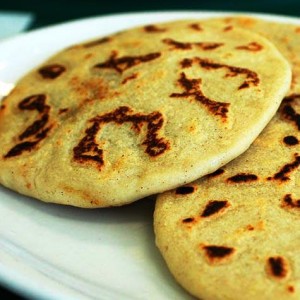FOOD: Mamenche’s the real deal for Central American cuisine
Posted on May 19, 2012 By Scott Lingley Culture, Dining, Food, Front Slider
 The first time I had a pupusa, it was in the very rooms now occupied by Mamenche’s Restaurant (10824 97 Street, 780.497.0037), a relative newcomer among Edmonton’s Central American food emporia. Back then, its 97 Street premises were the original home of Acajutla, a pioneer of said niche which has since relocated to the Avenue of Nations; subsequent to their residence, a Guatemalan operation called Los Comales did business there for a number of years before the present ownership took over about a year ago and instated a Salvadorian food regime.
The first time I had a pupusa, it was in the very rooms now occupied by Mamenche’s Restaurant (10824 97 Street, 780.497.0037), a relative newcomer among Edmonton’s Central American food emporia. Back then, its 97 Street premises were the original home of Acajutla, a pioneer of said niche which has since relocated to the Avenue of Nations; subsequent to their residence, a Guatemalan operation called Los Comales did business there for a number of years before the present ownership took over about a year ago and instated a Salvadorian food regime.
The good news is, despite the changes of the last decade-plus you can still get tasty, affordable and authentic Central American cuisine in that very spot. In fact, the physical difference between Los Comales and Mamenche’s, aside from the people running it, would only be obvious to keener eyes than mine. There are still bilingual homilies stenciled on the walls, still an assortment of Central American souvenir bric-a-brac on the gaily coloured walls, still a profusion of TV sets showing fractious Latino talk shows (the kind that require on-stage security guards) and maudlin tele-novellas which are, admittedly, luridly fascinating whether you speak Spanish or not.
And best of all, you can still get pupusas.
If you’re not familiar, a pupusa is what happens when a fresh-made tortilla – fashioned from a fine corn flour called masa harina – is filled with cheese and/or beans and/or chicharron (seasoned ground pork), pan-fried and served with a marinated cabbage-and-carrot slaw called curtido. Not only are they delicious, they usually go for around $3 a piece, making them the ideal appetizer or, in a stack, a substantial meal unto themselves. Rumour has it that pupusas are meant to be eaten with your hands, but I’ve never found a dignified (nor non-injurious) way to do that, which probably identifies me instantly as some kind of gringo.
Mamenche’s menu features lots of affordable variety, much of which, my friendly server advised me, could be made with or without meat as each dish is fashioned from scratch. Moreover, and in contrast to much of what passes for Mexican food this far north of the Rio Grande, these dishes don’t arrive stuck to the plate by excess quantities of congealed cheddar. You can enjoy a variety of Central American soups and nibblies, or go for more substantial platters like carne asada, grilled tilapia, or chilaquiles.
On my server’s advice, I decided to try the enchiladas ($7), along with a cheese pupusa and a glass of fresh-made carrot juice ($5). It was reassuring to hear the sounds of my food being made over the blubbering of the Latino soap opera—the whirr of the juicer and the faintly wet slap of my handmade pupusa being patted into existence. In minutes it was all in front of me, starting with a rust-coloured, frothy glass of carrot juice, a sip of which revealed a refreshing dash of celery in the mix.
The pupusa was perfectly formed and contained a lode of molten queso, with a side of vinegary, crunchy curtido thoughtfully dosed with a hint of chilies and oregano. I later remarked to the proprietress that my own attempts to make pupusas resulted in rather sloppy, leaky specimens; she just laughed and noted, “It’s not easy,” which, if not exactly the advice I was hoping for, made their $3 price tag seem even more of a bargain.
The enchiladas, which are also supposedly edible by hand, were a pair of housemade, fried corn-flour discs heaped with sliced chicken and hardboiled eggs, lettuce, more curtido and crumbled feta cheese, sided with a thin but tasty tomato sauce. Trying to pick these up would have resulted in most of it ending up in my lap and on the floor, so I resorted to a knife and fork.
I’m not sure I really needed more food at that point, but the friendly server steered me in the direction of the dessert menu, in which a $2 portion of rice pudding seemed too good a deal to turn down. My portion arrived steaming hot in parfait glass. I was happy to find it creamy and not too sweet, with a judicious sprinkle of cinnamon. All this goodness was got for less than $20, affirming Mamenche’s as a worthy continuation of its pupusa-making predecessors. Just don’t expect to find out how it’s done – that knowledge is worth more than three bucks.











